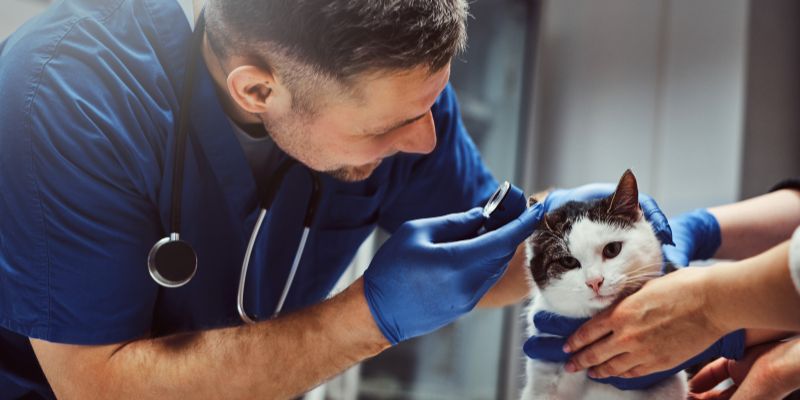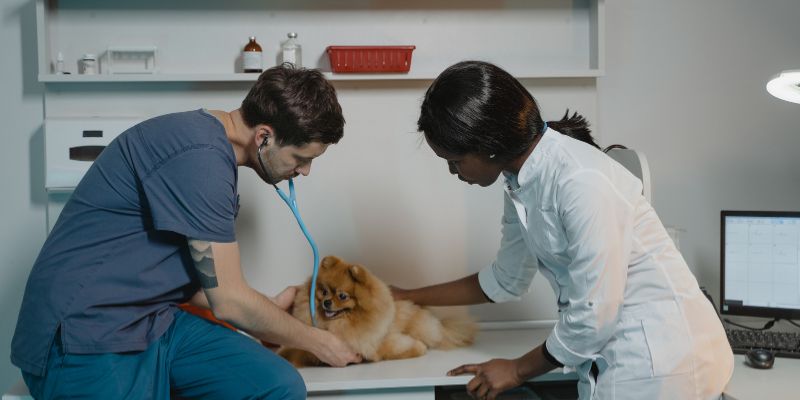How to Become a Veterinary Nurse.
A veterinary nurse is an important and fulfilling role for someone who has a passion for animals and wants to dedicate their careers to caring for them. You will require a range of skills to succeed in this role, including the ability to communicate well and adopt a personable approach. If you feel that you already have those qualities, then a role as a veterinary nurse could be ideal for you.
If you are interested in becoming a veterinary nurse, then there are various steps you need to take to progress into the career. Qualifications are necessary when applying for veterinary nursing jobs, and there are a few avenues that you can take. Below, we have explained the options you can take to become a veterinary nurse, and what is involved in the job.
What Does a Veterinary Nurse Do?
As part of your veterinary nurse training, you will be taught the skills and techniques required to succeed in this role. However, before you decide to take steps towards this career, you should know the roles and responsibilities of a veterinary nurse. Predominantly, your job is to provide expert care for animals in ill health.
On a day-to-day basis, you will work closely with a veterinary surgeon, providing support in various tasks, including surgical procedures. Whatever process the surgeon enacts, you will be there to help, and this may include taking blood and urine samples. Given that you will be working within a team, communication skills are vital.
Not only is it important to communicate well with your colleagues, you also need to interact with pet owners. It can be very distressing for someone who has an ill pet, so it is vital that you show compassion and draw upon your caring nature. On a daily basis, you will be speaking to various pet owners, as well as feed and treat the animals in your care.
How to Become a Veterinary Nurse Without Qualifications
In short, there is no way to become a veterinary nurse without qualifications, however there are a few options available to you. If you are already working in a veterinary clinic, then you can undergo veterinary nurse training in a BTEC, City & Guilds or NVQ course. Alternatively, you can go to university to study a degree in veterinary nursing.

How to Get Into Veterinary Nursing
If you are starting from scratch, then a Veterinary Nursing Assistant Level 2 Diploma (RQF) will give you the foundation knowledge you need to progress towards a qualification in veterinary nursing. Please note that you will likely need around five GCSEs at grade C/4 or above to embark on a veterinary nursing course.
If you don’t currently possess those qualifications, you can study for your GCSEs via Stonebridge Association Colleges, or you could achieve the equivalent through the Veterinary Nursing Assistant Level 2 Diploma (RQF). Not only can this qualification be regarded as an alternative to GCSEs, but it will also give you specialist foundation knowledge for your veterinary career.
Stonebridge Associated Colleges is one of the UK’s leading distance learning providers, with more than 650 courses and 50,000 students enrolled at any one time. The Veterinary Nursing Assistant Level 2 Diploma (RQF) is highly regarded by many veterinary practices as it is regulated by Ofqual, which has approved it as part of the Regulated Qualifications Framework (RQF).
What Do You Learn?
As part of the course, you will learn a variety of skills that will help you secure a role as a veterinary nurse assistant. Your study schedule is made up of various units, some of which are outlined below:
-
Principles of Animal Health – It is vital that as a veterinary nurse assistant you can notice signs of ill health. In this part of the course, you will cover various veterinary practice terminology and how to spot normal and abnormal health in dogs, cats, hamsters, lizards, guinea pigs and more
-
Veterinary Instruments – Depending on the condition of the animal in your care, you will need specific veterinary instruments for specific treatments. In this unit, you will learn what instruments that are required for routine surgeries, such as tumour removal and castration
-
Principles of Hygiene, Cleaning and Disinfection – To prevent the spread of disease and infection, you need to make sure that the environment is clean. It is important, though, that you know the difference between disinfection and sterilisation. This is what you will learn during this part of the course
-
Care of Wildlife in Veterinary Practice – Domestic pets are not the only animals that are treated by veterinary professionals. As a veterinary nurse assistant, you may also have to help treat injured and ill wildlife
To pass the course, you will have to provide an online-based portfolio of evidence to prove your knowledge and understanding of what you have learned over the duration of the course.

Can I Study Online?
By learning through Stonebridge Associated Colleges, you will be able to learn the Veterinary Nursing Assistant Level 2 Diploma (RQF) online. This non-practical course means that you will be able to study all your required elements online. In fact, as soon as you enrol on the course, you will be given all of the course materials you need to complete the course.
Traditionally, when a person studied for a qualification, they would have to do in-person study at a college or educational facility. Now, though, with the help of Stonebridge Associated Colleges, you can earn a nationally recognised qualification solely online. One of the many great things about this is that you have the freedom to learn at your own pace.
Some people feel that they don’t have the time to study because they are raising young children or are busy working full-time. Well, by opting for an online course, you can study at a time that fits into your schedule. So, whether it first thing in the morning, at night after the kids have gone to sleep or on weekends, you can tailor your study schedule.
This level of freedom means that you can study the Veterinary Nursing Assistant Level 2 Diploma (RQF) from the comfort of your own home. In fact, you can study anywhere in the world! The course materials provided to you will include all the information you need to complete it successfully. Remember, you will also be able to contact your tutor and Student Support Officers for help and guidance.
Depending on the type of course you study, you could move on to university. Most universities accept Access to Higher Education Diplomas, which are widely regarded as the equivalent to A Levels. As you can see, there are many options available to you, and Stonebridge Associated Colleges can help you choose the best option for your circumstances and career goals.
Take Steps Towards Your Career Goals Today!
If you are wondering how to become a veterinary nurse, then there are a few avenues you can take. Starting off as a veterinary nurse assistant is an effective way to gain the foundation knowledge and practical experience you need to progress towards a career as a veterinary nurse. Remember, though, that accredited qualifications are needed in order to work in this role.
To find out more information about the veterinary courses provided by Stonebridge Association Colleges, give one of our Career Advisers a call on 0121 392 8288. Alternatively, you can send your enquiry via our support centre.




